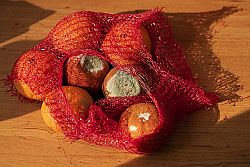

A recent publication by the Waste and Resources Action Programme (WRAP) charity calls for the end of unnecessary plastic packaging and the Best Before labels on fresh fruit and vegetables sold in the UK.
WRAP's 18-month study looked at the sales of fresh fruit and vegetables in the supermarkets debunks the idea that plastic packaging and wrapping on the majority of fresh produce helps prevent food waste.
According to the shops and supermarkets, bagging produce by weight helps prevent food waste, because it is perceived that packaging will slow down the process of decaying and protect from physical damage. However, the study clearly presented that packing fresh produce in bags makes customers buy more than they need, ultimately increasing the amount of food waste, in addition to the plastic packaging that needs to be disposed of.
Additionally, the "best before" labels placed on uncut fruit and vegetables increase the problem of food waste, where some fresh produce is discarded only on the basis of that date, even though it is still safe and good to consume.
Following the findings of the study, WRAP is calling all major retailers in the UK to redesign the way they sell uncut fresh produce and:
WRAP tested five commonly wasted items, which included apples, bananas, broccoli, cucumber and potatoes. Those items were then stored in the original packaging as well as loose and at different temperatures.
The charity then discovered that selling those foods lose and removing Best Before dates could result in a combined saving of around 100,000 tonnes of household food waste, more than 10,300 tonnes of plastic and 130,000 tonnes of CO2e. Those savings originate from both customers buying the right amount they need and using their judgement to decide when items are still good to eat.
Marcus Gover, the CEO of WRAP said: "This important research could be a game-changer in the fight against food waste and plastic pollution. We have demystified the relationship between wasted food, plastic packaging, date labels and food storage. While the packaging is important and often carries out a critical role to protect food, we have proven that plastic packaging doesn't necessarily prolong the life of uncut fresh produce. It can in fact increase food waste in this case. We have shown the massive potential to save good food from being thrown away by removing date labels.
"We are all living with the reality of the climate emergency and the rising cost of living. This new clarity could not be more timely. We need retailers to step up and follow our recommendations so we can achieve real progress in tackling food waste and plastic pollution. This helps save the planet and us money at the same time – a real win-win."
For more information on this subject, see: